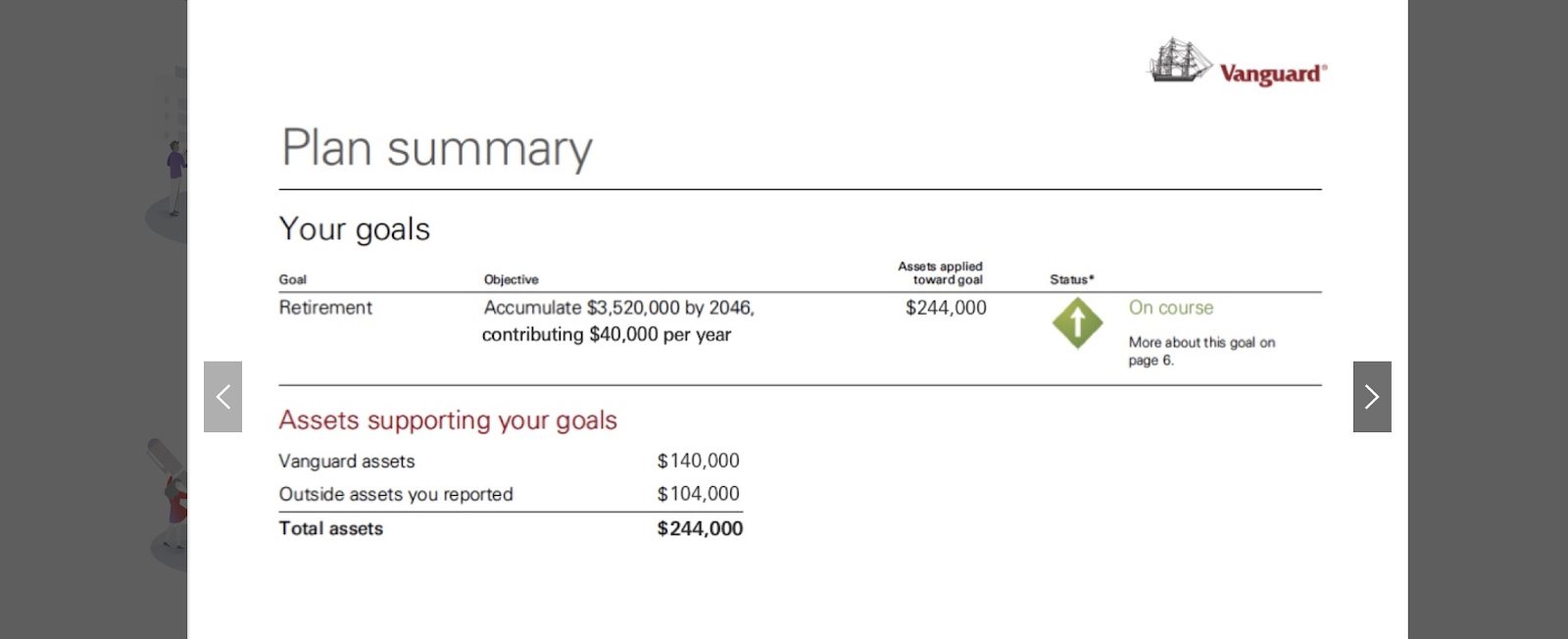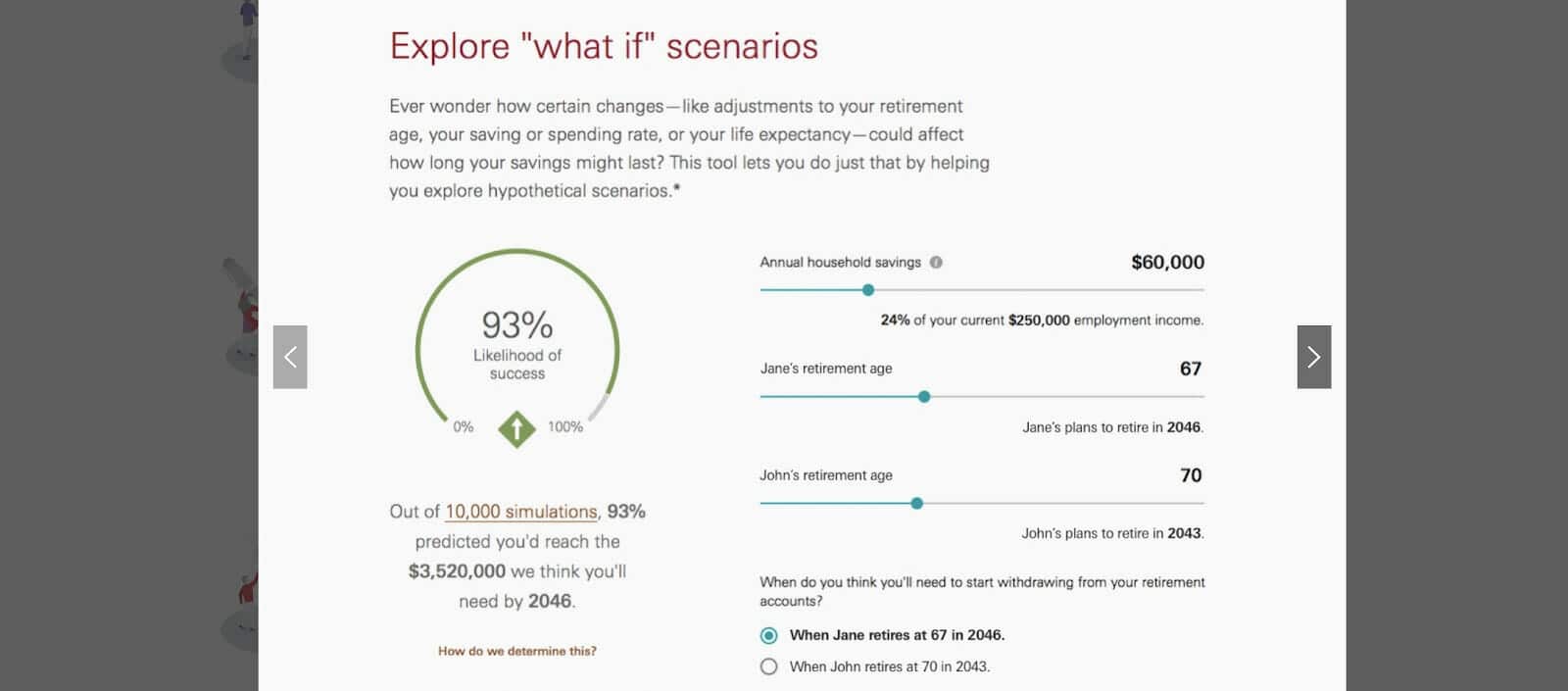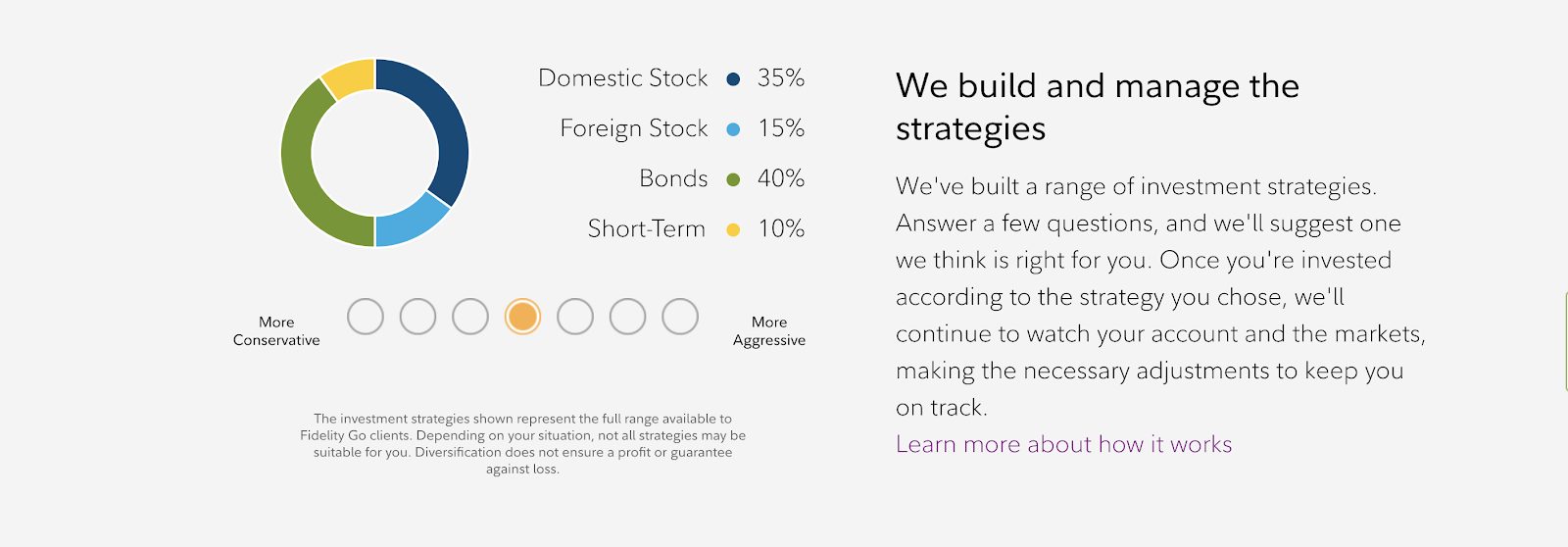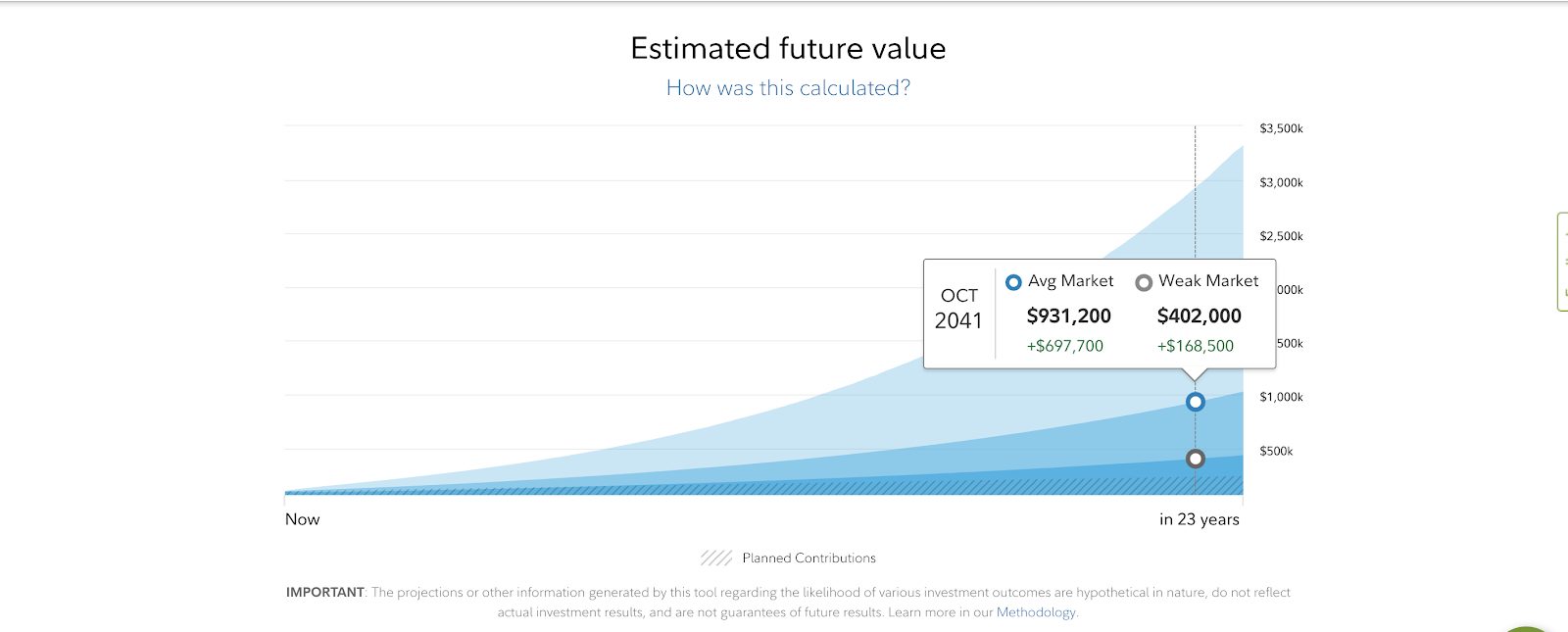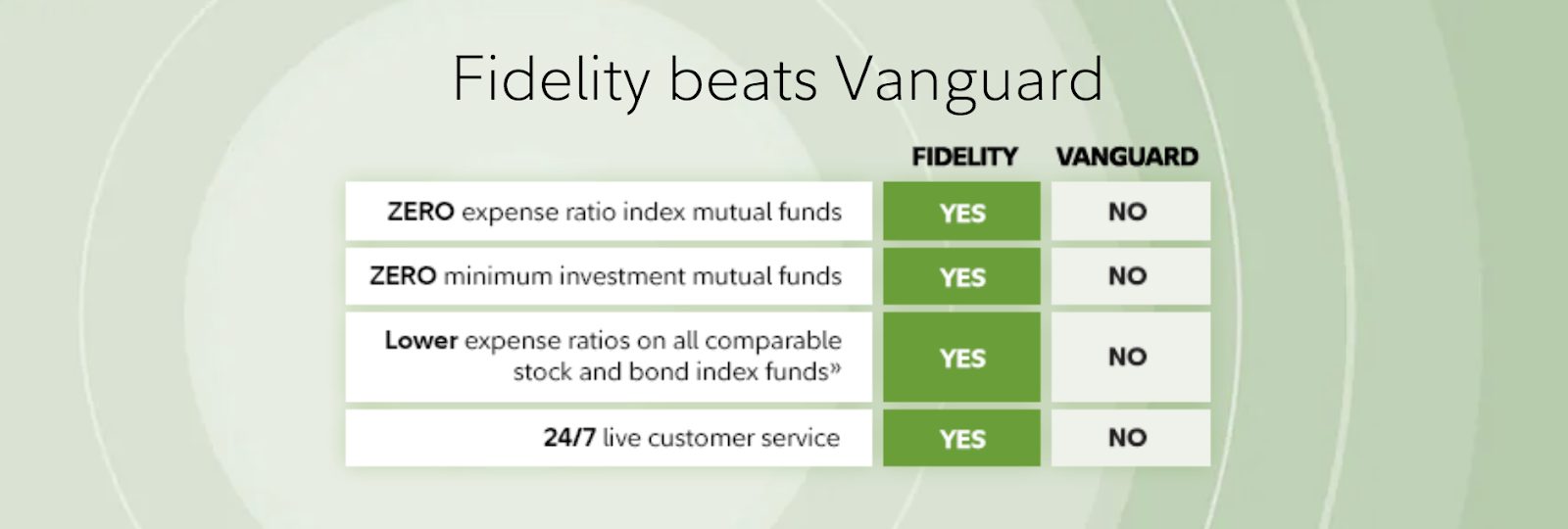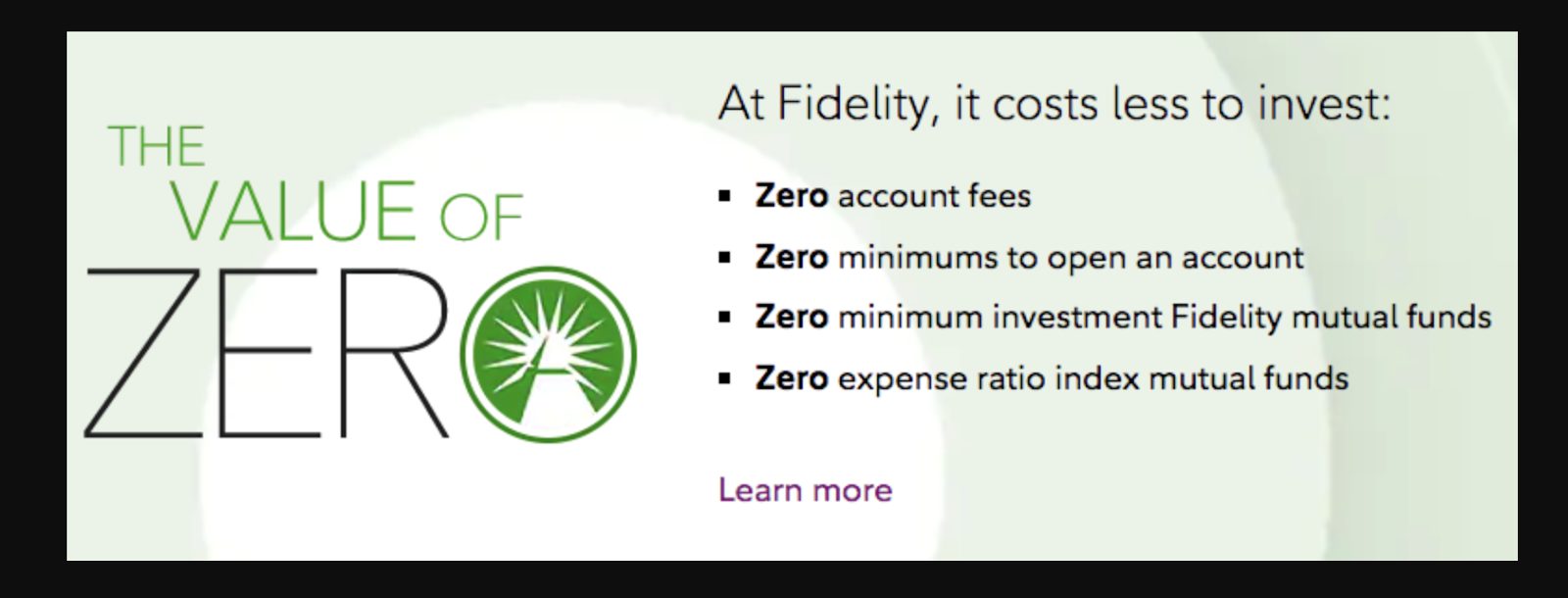- Vanguard vs. Fidelity: Who Are They?
- Minimum Investment Requirements
- Financial Advice
- Fees and Costs
- Index Funds, ETFs, and What’s the Difference?
- Building a Core-Four Portfolio: Which Brokerage Service Is Better?
- U.S. Equities: Total Stock Market Funds
- REITs
- Results
- User Experience and Mobile App
- Unique Offerings
- Final Thoughts
Vanguard vs Fidelity conjures up an epic image of two warriors battling it out in the Roman Colosseum. Who will prevail in the coveted wealth management arena? If I were new to investing, I’d want to know who’s best (spoiler alert – they’re both stellar companies offering exceptional products).
But still… what would I want to know?
As an investor, I’m concerned with:
- Fees
- Operating costs
- Minimum investment requirements
- Product offerings and if they’re aligned with my needs
Investing is a core part of my wealth-building strategy and a few low-cost index funds serve as its foundation.
I’m going to show you how these two brokerage firms stack up in terms of pricing, fees, and investment products. I will also show you a couple of things that make these companies unique.
We will also compare a lazy-four fund portfolio using only Vanguard funds in one example and only Fidelity funds in another – just for fun. How will they measure up?
Let’s find out.
Vanguard vs. Fidelity: Who Are They?
The main difference between Vanguard and Fidelity is that Fidelity has a platform for active traders. They offer a suite of decision tech tools, including Active Trader Pro and mobile trading for their on-the-go clients. You’ll also find two elite service levels, Active Trader and Active Trader VIP, each with its customer support levels based on your trading volume.
Vanguard
Vanguard was founded in 1975 by John Bogle who created the first index fund. They have 20 million users and $5.3 trillion in assets under management (AUM). They’re the largest provider of mutual funds and the second-largest provider of ETFs globally.
John Bogle fought to lower costs for the ordinary investor.
Their product offerings are many:
- Traditional and Roth IRAs
- Annuities
- 529 College Savings plans
- SEP, i401k, and SIMPLE IRAs
- 403b services
- Individual and Joint accounts
- 401k Rollovers
- Mutual Funds & ETFs
- Individual Stocks, Bonds, CDs, and Options
- Factor-based Investing (smart beta)
- Sector Investing
- ESG (environmental, social, and governance) Investing
Vanguard’s Wellington Fund, created before Vanguard’s formation and has weathered both the Great Depression and the 2008 Financial Crisis, turns 90 years old this year. Vanguard is headquartered in Malvern, Pennsylvania.
Vanguard is owned by their funds so they are uniquely aligned with the interest of their investors. As a result, Vanguard funds usually have the lowest fee rate in their category. Mind you, signing up is more work and requires more decisions than Betterment.
Fidelity
Fidelity opened its doors in 1946 under Edward C. Johnson’s leadership with $13 million AUM. He established the Puritan Fund – “the first income-oriented mutual fund to invest in a portfolio of common stocks.”
Fidelity Investments has grown to offer tens of thousands of funds, including selecting the first zero expense ratio funds (more on that later), establishing a 70-year track record, and $2 trillion AUM.
Here is a peek at their offerings:
- Mutual Funds
- SEP, SIMPLE, Traditional, and Roth IRAs
- Self-employed 401(k)s
- Decision Tech Advanced Trading
- Options
- Stocks, bonds, CDs, and ETFs
- Annuities
- 529 College Savings plans
- Cash Management & Credit Cards
- Factor-based Investing
- Socially Responsible Investing (SRI)
They’re now one of the largest asset managers in the world and have nearly identical product offerings as Vanguard – perhaps even more. In addition, they’vepedia, Investor’s Business Daily, and Stockbrokers.com have rated them the number one online broker. Fidelity is headquartered in Boston, Massachusetts.
Minimum Investment:
$1,000
Management Fees:
0.04% - 0.30% advisory fee
Promotion:
Invest
Tax Loss Harvesting:
Yes
Portfolio Rebalancing:
Yes
Assets Under Management:
$5.3 trillion
Minimum Investment:
$0
Management Fees:
0.35% - 1.05% advisory fees
Promotion:
Open Your Account
Tax Loss Harvesting:
No
Portfolio Rebalancing:
Yes
Assets Under Management:
$2 trillion
Minimum Investment Requirements
Retail Mutual funds
Many times, getting started is the biggest hurdle investors face. And sometimes, it’s because of the minimum investment requirements. Unfortunately, Fidelity has no minimums to start investing. That’s a big deal if you have little money in the bank.
Vanguard funds typically require a $3,000 minimum, though some funds (like their Target Date Retirement Funds and Star Funds) start at $1,000. ETFs, stocks, CDs, and bonds all cost the price of one share.
Get our best strategies, tools, and support sent straight to your inbox.
Financial Advice
You’ll want an advisor if you’re a hands-off investor and prefer someone else managing your money.
Vanguard
If your net worth is below $50,000, you’ll have access to Vanguard’s team of registered financial advisors at no cost. They’re available via email or phone Monday thru Friday, and they’ll answer any questions you have.
For a customized financial plan, Vanguard offers advisory services for a 0.30% fee with a $50,000 minimum. That fee drops to 0.20% for investors with $5-$10 million in assets. Assets between $10 and $25 million get a 0.10% management fee, and over $25 million get you .05%.
You’ll have access to a financial dashboard with a bird’s eye view of your economic landscape. Your advisor will explore “what if” scenarios and test whether your asset mix is on track. You’ll also have reports on the projected range of balances for different market scenarios.
Fidelity
Fidelity gives investors options for financial planning. For example, their Robo-Advisor, Fidelity Go, requires no minimum and will manage your money for a 0.35% advisory fee.
If you require a human touch, Fidelity’s robo hybrid, Personalized Planning and Advice Service, offers digital investing and coaching for a $25,000 minimum and a 0.5% advisory fee.
Their Wealth Management Service gets you help from a dedicated advisor for a $250,000 minimum and an advisory fee ranging between 0.5% – 1.05%.
Private Wealth Management gets you an entire advisor-led team between 0.5% and 1.05% fee, but the minimum is $2 million.
Vanguard wins this round because their fee is lower. Vanguard’s advisory cost decreases the more you invest while Fidelity’s goes up.
Fees and Costs
Stock Trading
Only a handful of Vanguard funds charge fees (purchase or redemption fees to discourage short-term, speculative trading) to cover high transaction costs. The rest of their funds carry no commissions when you buy and sell their mutual funds or ETFs.
Vanguard has a tiered structure depending on your account balance – the higher your balance, the lower the cost per trade.
For Vanguard online stock trades:
- Balances under $50,000 – $7 first 25 trades, $20 after
- Balances between $50,000 and $500,000 – $7 per trade
- $500,000 and $1M cost $2 per trade
- $1M and $5M cost $0 for first 25 trades and $2 thereafter
Vanguard offers 3,000 no-transaction-fee mutual funds and 1,800 commission-free ETFs.
Fidelity charges $4.95 per online U.S. equity trades. Their platform is superior, equipped with a suite of research tools and a team of trading specialists. Their award-winning Active Trader Pro platform is full of advanced features and part of Fidelity’s Decision Tech tools.
They even have a tiered trading platform with two added layers of service:
- Active Trader Services (120+ trades annually)
- Active Trader VIP (500+ trades annually)
Fidelity offers nearly 3,700 no-transaction-fee mutual funds and over 500 commission-free ETFs.
This one goes to Fidelity. If you like trading, they’re worth a look.
Expense Ratios
The average Vanguard mutual fund expense ratio is 83% less than the industry average. You’re only paying them what it costs to run the fund. Their low costs are why many brokerage firms (like Fidelity) have competitive prices in what’s come to be known as the Vanguard Effect.
“Expense ratios for a market’s mutual funds and ETFs tend to drop when low-cost pioneer vanguard jumps in.” – Marketwatch
“The pressure that the giant’s meager fees put on others to cut costs. Some rivals now sell passive products priced specifically to match or undercut it.” – The Economist
Fidelity has risen to the occasion and undercuts many of Vanguard’s operating costs. For example, Fidelity’s Total Market Index Fund is 0.015% and carries no minimum, while Vanguard’s Total Market Index Fund is 0.04% and has a $3,000 account minimum.
Fidelity wins here. Many of their funds now carry a lower cost than their Vanguard equivalent.
To determine how much you’re losing to fees, try Personal Capital’s Fee Analyzer tool. It’s free to use and provides insights on ways to optimize your portfolio.
Empower's free fee analyzer helps you understand how investment fees affect your retirement savings. It analyzes your holdings, estimates future fee impact, and suggests ways to potentially save by lowering fees in your retirement portfolio.
Account Service Fee and Transfer Out Fees
Vanguard carries a $20 annual account service fee for each brokerage and retirement account. However, the fee is easily waived by signing up for an e-delivery service or if you have $10,000 already invested. There’s no fee if you want to transfer out of your Vanguard account.
Fidelity has no account service or transfer out fee.
We’ll call this round a draw.
Index Funds, ETFs, and What’s the Difference?
Similarities between index funds and ETFs:
They both represent baskets of securities with built-in diversification. They’re professionally managed – but track an index rather than actively managed (the manager is there to keep the fund from straying off the index being tracked).
If you’re keen on lower minimums, ETFs are better. Many mutual funds (like Vanguard) have minimums ranging from $1,000 to $3,000. The price of one ETF share run as low as $50.
Mutual fund minimum initial investments aren’t based on the fund’s share price. Instead, they’re a flat dollar amount. – Vanguard
ETFs are priced in real-time, so the price fluctuates throughout the day like an individual stock. Mutual funds (index funds are just mutual funds tracking an index) don’t care about when you place a trade; you get the same price at the end of the trading day as everyone else.
Also, ETFs don’t let you make recurring deposits. You can automatically fund your account, but you’ll have to manually enter your transactions (the exception to this rule is if you use a
Let’s compare a few top funds from Vanguard and a few from Fidelity using index funds as examples.
Building a Core-Four Portfolio: Which Brokerage Service Is Better?
For this game, we’re going to use a lazy portfolio with four funds:
- Total Stock Market Index Fund (U.S. equities)
- Total International Stock Index Fund
- Total Bond Index Fund (U.S. fixed-income)
- Real Estate Investment Trust (REIT)
U.S. Equities: Total Stock Market Funds
Fidelity Total Market Index Fund (FSKAX) vs. Vanguard Total Stock Market Index Fund Admiral Shares (VTSAX)
This wise sentiment sums up the creation of index funds:
Index funds were created because picking winning stocks is virtually impossible. It’s like trying to find a needle in a haystack. Instead, buy the haystack.
Vanguard’s expense ratio is 0.04% (40 cents for every $1,000 invested) while Fidelity’s is 0.015% (15 cents for every $1,000 invested).
Both of these costs are insanely low. Remember the Vanguard Effect? The competition has made it its mission to tackle Vanguard’s low fees.
Each has around 3,500 stocks (Vanguard 3,599, Fidelity 3,373) and both have had similar returns. The average return since inception for VTSAX is 6.82% while Fidelity carries a return of 14.52%.
VTSAX:
- 6.82% average return since inception
- 0.04% expense ratio
- $3,000 minimum
- 14.52% average return since inception
- 0.015% expense ratio
- $0 minimum
Winner: Fidelity.
Award-winning trading platform with robust investing tools, straightforward pricing, and wealth management services.
Fidelity Total International Index Fund (FTIHX) vs. Vanguard Total International Stock Index Admiral Shares (VTIAX)
For international exposure, we’re going to take on a global stock index fund. Again, both funds are insanely low cost.
- 4.67% average return since inception
- 0.11% expense ratio
- $3,000 minimum
- 7.22% average return since inception
- 0.06% expense ratio
- $0 minimum
Winner: Fidelity.
Fidelity Total Bond Fund (FTBFX) vs. Vanguard Total Bond Market Index Fund Admiral Shares (VBTLX)
These total bond funds have slightly different holdings, but it’s as close as we’re getting for this round.
FTBFX is a core-plus fund. What’s this?
It takes on adding securities with a greater return/risk component to a core base of holdings with a specified objective – Investopedia
In other words, it invests 80% in investment-grade bonds and 20% in below-investment-grade securities to boost return potential.
VBTLX is classified as a low-cost core fund. What’s this?
It’s a single diversified bond fund product with broad exposure to the investment-grade area of the bond market, primarily in US treasuries. – The Balance.
It’s primarily concentrated in government-backed securities.
- 4.19% average return
- 0.05% expense ratio
- $3,000 minimum
- 4.89% average return
- 0.45% expense ratio
- $0 minimum
Winner: Too close to call. Returns are similar, but Fidelity’s expense ratio is higher.

REITs
Fidelity Real Estate Index Fund (FSRNX) vs. Vanguard Real Estate Index Fund Admiral Shares (VGSLX)
Real estate isn’t correlated to either the stock or bond market and adds another layer of diversification to your portfolio.
Fidelity’s Real Estate Index Fund, FSRNX, is based in domestic equities with a concentration in industrial, office, and residential properties.
Vanguard’s Real Estate Index Admiral Shares VGSLX is also heavily concentrated in retail and residential properties.
- 10.48% average return
- 0.12% expense ratio
- $3,000
- 10.12% average return
- 0.07% expense ratio
- $0 minimum
Winner: Fidelity has the edge here with $0 minimum.
Results
Vanguard total costs:
- $12,000 needed to open an account for these four funds
- 0.08% average expense ratio
- 6.54% cumulative portfolio return
Fidelity total costs:
- $0 needed to open accounts
- 0.14% average expense ratio
- 9.19% cumulative portfolio return
Fidelity wins on both cost and average return while Vanguard wins on expense ratios. Does this make Fidelity better than Vanguard? In this round, maybe, but depending on your needs, your expenses will vary.
User Experience and Mobile App
I only care if I can easily navigate their website from my laptop and make deposits from my smartphone. Both Vanguard and Fidelity have these features and both are iOS and Android-friendly. Win-Win.
Unique Offerings
Fidelity
Fidelity unleashed four zero-expense ratio mutual funds between August and September 2018 – the first retail brokerage firm to do this. All to undercut competitors. The four funds are passively managed, tracking a corresponding index. The funds are:
- Zero Total Market Index Fund (domestic equities)
- Zero International Index Fund: tracks ~75% developed and ~25% emerging international markets
- Zero Extended Market Index Fund: small-cap equivalent
- Zero Large Cap Index Fund: S&P 500 equivalent
All of these funds carry no expense ratios, and when buying directly from Fidelity, no fees of any kind. These funds are meant to bring cost-conscious investors to the table.
One way Fidelity keeps costs down is by creating its indexes to track so they avoid licensing fees (from the S&P 500 or MSCI for example).
For the Total Market Index Fund, they created the Fidelity U.S. Total Investable Market Index. The International Index Fund tracks the Fidelity Global ex-U.S. Index.
The fee-free funds do hold fewer stocks than their expense ratio-carrying counterparts. The Total Market Index tracks 2,500 stocks compared to the 3,500 followed by Vanguard’s Total Stock Market fund. The international fund holds 2,300 shares versus the 4,735 stocks in the Fidelity Total International Index Fund.
The funds are barely a year old, so there isn’t much data to track yet. Let them prove themselves before switching over.
Vanguard
They’ve been the low-cost leader for decades ever since John Bogle created the first index fund revolutionizing the industry and lowering costs for ordinary investors.
They’re also client-owned. You, a shareholder of Vanguard funds, own a piece of the company. You only pay the cost of operating the fund. When outside influences (aka outside stockholders or third parties) own an investment management company, the company has to pay the shareholders (translation: more fees to you).
Because Vanguard is client-owned, there’s no pressure to generate profits for shareholders.
Tweet ThisClients and company owners are never pitted against one another because they’re the same.
Heartbeat Trades
Vanguard has found another way to pass along savings to investors through heartbeat trades. It’s the process of attaching an ETF to a mutual fund, deferring capital gains taxes normally incurred by investors.
They even developed a patent to avoid paying taxes on mutual funds. Starting with their total stock market fund in 2001, investors have paid $0 in capital gains. Vanguard has gone on to include this in 14 stock funds.
They generated $191 billion in gains and were still able to report zero to the IRS. These transactions carry a bit of controversy and are commonly used for exchange-traded funds (ETFs).
Here’s how the folks at Bloomberg put it:
Vanguard attaches a more tax-efficient ETF to an existing mutual fund. Then the ETF siphons appreciated stocks out of the mutual fund without incurring taxes, often using heartbeat trades.
It’s referred to as a “tax dialysis machine.” Vanguard patented this structure until 2023, keeping competitors at bay, and unable to duplicate it. Investors in Vanguard mutual funds have the luxury of paying zero capital gains until selling the fund.

Source: Bloomberg
Because Vanguard added an ETF share class to existing mutual funds (and didn’t create a stand-alone ETF), mutual fund and ETF investors would own the same pool of underlying stocks.
What does this mean for Vanguard mutual fund investors? Enhanced tax-efficiency. This article goes into great detail about the ETF tax dodge. It’s all perfectly legal.
Bottom line, once Vanguard added an ETF class back in 2001; investors ceased paying capital gains in those corresponding funds. Investors in Vanguard mutual funds are sure to reap the benefits of this tax loophole – until the Internal Revenue Service says otherwise.
Final Thoughts
Vanguard vs Fidelity: Who’s the Best Brokerage Service?
So, who’s better? I’m biased as both my Roth and taxable accounts live at Vanguard. Everything I’ve ever read always touted Vanguard as the low-cost leader so I went with them.
I love their unique story of being client-owned, and I love that John Bogle went head-to-head with Wall Street and fought for us ordinary investors to make it more cost-efficient.
So, I like them. I use their products and will continue to do so unless I feel otherwise. I’m not a rate chaser and think it’s too much work to leave one company for another (even for Fidelity’s zero and 0.015% expense ratio funds). The difference is negligible at this point.
They both offer award-winning products, have exceptional customer service, and lead the industry in cost efficiency. I’d say go with Fidelity if you’re an active trader as they have a remarkable platform supporting it. Vanguard doesn’t cater as well to that demographic the way Fidelity does.
This comes down to a gut decision. If one feels better, go with them. There’s plenty of value to be had with both companies. They’re established, time-tested, and have displayed why they’re leaders in the retail investing world.



